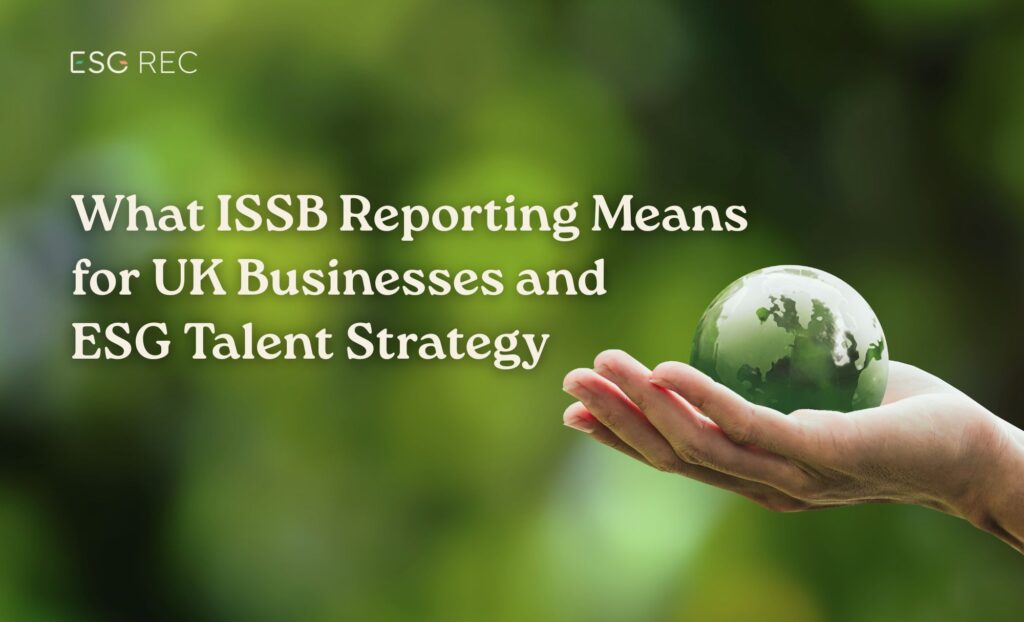
As the UK prepares to adopt ISSB-aligned sustainability standards, companies will need to respond not only with stronger reporting frameworks, but also with the right internal expertise. This article outlines key implications for teams, structures, and skills.
In 2024, the UK Government confirmed its support for the adoption of the International Sustainability Standards Board (ISSB) framework. This signals a shift toward more standardised and financially relevant sustainability reporting, aligned with global expectations1.
The ISSB has issued two core standards:
- IFRS S1 – General Requirements for Disclosure of Sustainability-related Financial Information
- IFRS S2 – Climate-related Disclosures
These standards aim to provide a consistent, comparable baseline for sustainability disclosures. The UK intends to begin implementing ISSB-aligned disclosures through the Sustainability Disclosure Standards (SDS), with initial reporting likely to begin from 2025 for certain companies2.
How ISSB Differs from Existing ESG Frameworks
While many UK businesses are familiar with voluntary ESG frameworks such as TCFD, CDP, or GRI, the ISSB introduces a number of changes:
- Mandatory reporting: The standards are expected to become part of UK regulatory reporting for larger firms.
- Focus on financial materiality: ISSB prioritises sustainability information that affects enterprise value.
- Greater assurance expectations: Disclosures must be accurate, consistent, and increasingly auditable.
- Integration into financial reports: ESG data will move from standalone reports into the heart of financial filings3.
This is a step change in the way companies are expected to treat climate and sustainability issues — moving from narrative to financially material reporting.
Shared Accountability Across Teams
One of the more complex challenges of ISSB implementation lies in accountability. Unlike traditional ESG reporting, which may sit solely with a sustainability team, ISSB-aligned disclosures require collaboration between multiple business functions.
| Function | Area of Responsibility |
|---|---|
| Finance | Integrating ESG risks and metrics into investor-facing financial reports |
| Sustainability | Providing data, context, and risk assessments |
| Risk and Audit | Ensuring internal controls and assurance processes |
| Legal and Compliance | Supporting regulatory alignment and governance |
| Executive Leadership | Overseeing strategic direction and decision-making |
Many companies are now beginning to map internal roles and responsibilities to ensure they can meet the requirements in a coordinated and reliable way.
Evolving Talent Requirements
The increasing complexity and rigour of sustainability reporting has led many organisations to evaluate whether they have the right internal skills to meet ISSB expectations.
Some of the roles likely to play a key role in ISSB readiness include:
- ESG Reporting Leads with experience in regulated frameworks
- Climate Risk and Scenario Analysts
- Sustainability Data Managers
- Professionals with expertise in audit, finance, and ESG integration
- Individuals with cross-functional experience across compliance, operations, and sustainability
The ability to interpret materiality, manage complex data, and communicate ESG performance in financial terms is becoming essential.
Questions to Consider
As organisations begin to prepare, several key questions can help guide planning:
- Have we identified how ISSB standards apply to our organisation?
- Do we have internal capabilities to gather, validate, and analyse ESG data?
- Are our finance and ESG teams aligned on how to assess material sustainability risks?
- Do we understand which roles will need to change or evolve to support compliance?
Early planning, cross-functional collaboration, and upskilling efforts will all contribute to a smoother transition.
Preparing for What Comes Next
ISSB reporting marks a new phase in ESG disclosure — one where regulatory expectations are rising, and where the quality of reporting will reflect directly on a company’s credibility with stakeholders, investors, and regulators.
The focus now must be on building integrated, skilled teams that can work across disciplines and deliver high-quality, decision-useful disclosures.
If your organisation is reviewing internal capacity to meet ISSB standards and would like to discuss talent requirements or hiring options, feel free to reach out to us for a consultation.
You can contact the ESG REC team at info@esgrec.com.
References:
- UK Government (2024). UK Sustainability Disclosure Standards (UK SDS) – https://www.gov.uk/government/publications/sustainability-disclosure-requirements-uk-endorsement-of-ifrs-s1-and-ifrs-s2 ↩
- International Sustainability Standards Board. (2023). IFRS S1 and IFRS S2 Final Standards – https://www.ifrs.org/news-and-events/news/2023/06/issb-issues-ifrs-s1-and-ifrs-s2/ ↩
- Financial Reporting Council (FRC). (2024). FRC response to ISSB and UK implementation roadmap – https://www.frc.org.uk/news/june-2024/frc-supports-issb-implementation-in-uk ↩


